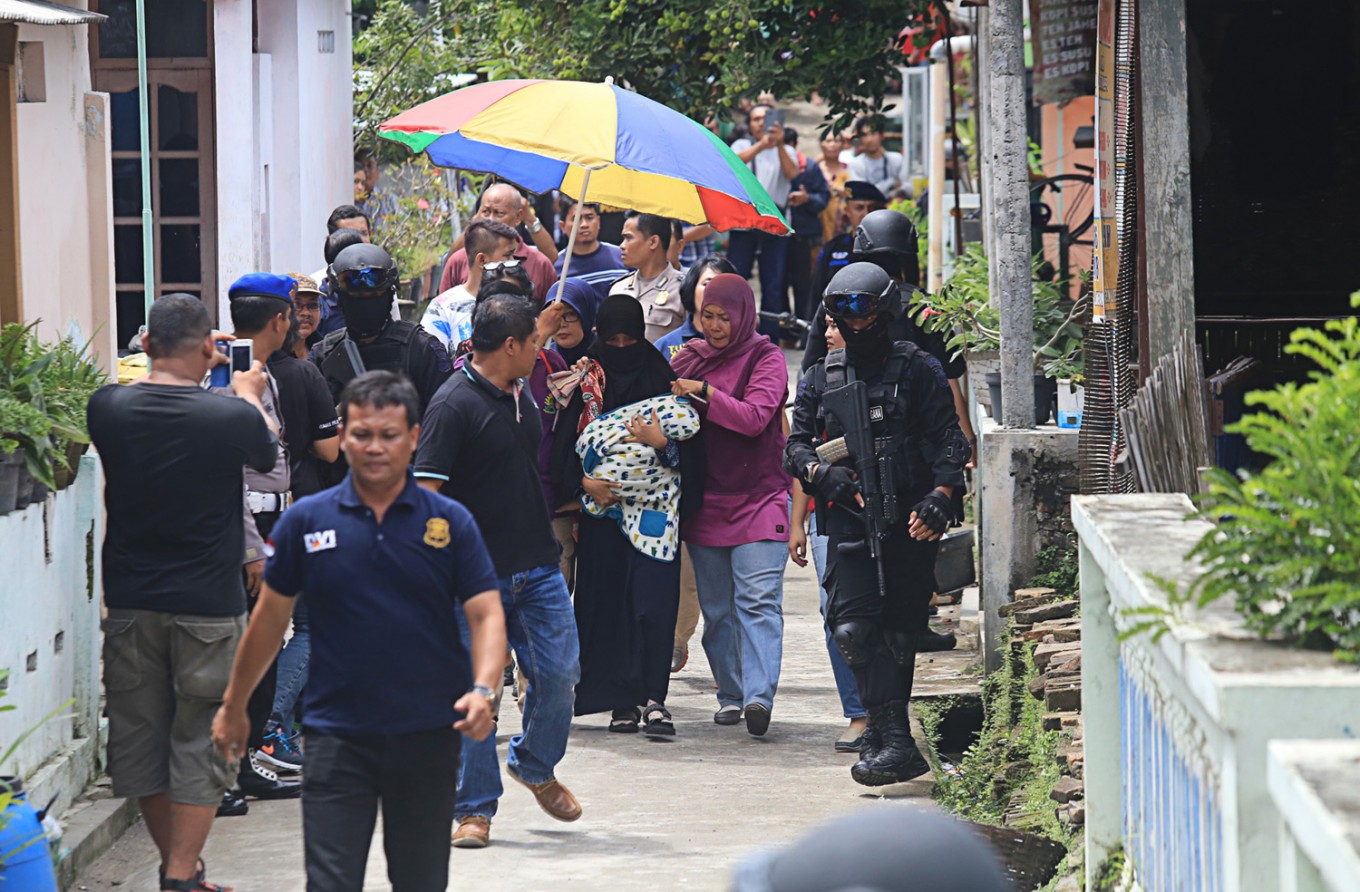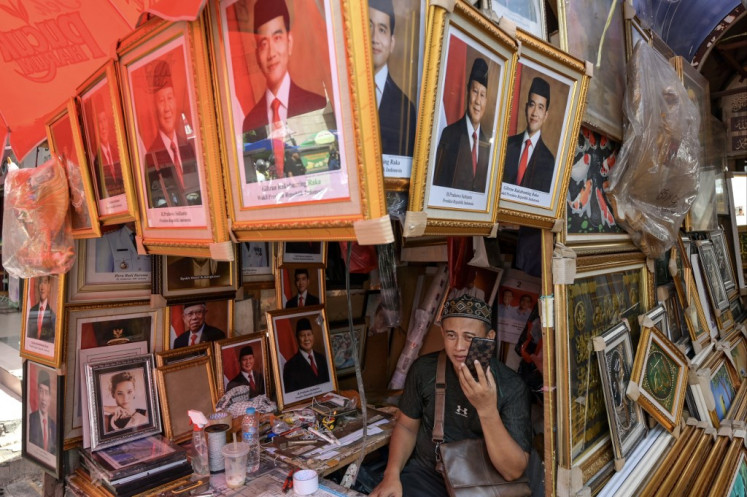Gendering terrorism in Indonesia
The recent arrest of four female terrorist suspects, two in Bekasi, one in Tasikmalaya and the other in Purworejo, by the National Police’s Densus 88 counterterrorism squad has surprised many.
Dominated by patriarchal values, Indonesia is still struggling to come to terms with the idea of female attackers or women terrorists, and this has sparked controversy. Did we miss something?
Change Size
 Tight escort – Personnel of the National Police’s Densus 88 counterterrorism squad pick up Rinda (center), 24, the wife of terrorist suspect Nur Solihin from their house in Kampung Griyan, Laweyan, Surakarta, Central Java, on Sunday. She was taken into custody following the arrest of Nur Solihin in Jakarta. (JP/Ganug Nugroho Adi)
Tight escort – Personnel of the National Police’s Densus 88 counterterrorism squad pick up Rinda (center), 24, the wife of terrorist suspect Nur Solihin from their house in Kampung Griyan, Laweyan, Surakarta, Central Java, on Sunday. She was taken into custody following the arrest of Nur Solihin in Jakarta. (JP/Ganug Nugroho Adi)
T
he recent arrest of four female terrorist suspects, two in Bekasi, one in Tasikmalaya and the other in Purworejo, by the National Police’s Densus 88 counterterrorism squad has surprised many.
The media quoted police officers and national security analysts explaining that the use of women in planned attacks was a new terrorism strategy in Indonesia.
Dominated by patriarchal values, Indonesia is still struggling to come to terms with the idea of female attackers or women terrorists, and this has sparked controversy. Did we miss something?
(Read also: Women playing greater role in terrorism)
The perplexed reaction toward the active involvement of women in terrorist attacks exposes the gender blindness of terrorism discourse in Indonesia. When we talk about terrorist attacks, the image that immediately comes to mind will most likely be a picture of those intimidating men with guns holding an IS flag.
It is considered abnormal for women to play such a role. Rather, women are usually framed as vulnerable victims and passive actors.
Ironically, the public’s tendency to underestimate women’s capabilities has allowed terrorist groups to use them strategically. It is exactly the gendered stereotype that women are helpless and only play second fiddle as faithful wives and daughters that has enabled terrorist organizations to utilize them as an effective, deceiving weapon.
Women can keep a low profile and escape the police’s radar exactly because of this stereotype. The use of women could be part of the terrorist groups’ strategy to shame and put pressure on male terrorists to be more militant.
For women, a terrorist organization might be attractive as it offers them opportunities to participate and become involved in a political cause in a way that is acceptable according to their religious views. In other words, terrorist organizations actually give women an alternative sense of agency as jihadists.
Many reports indicate that when joining terrorist organizations, women do so by becoming a “bride” to support male jihadists. However, it would be interesting to investigate whether women were attracted to join the organizations because they really wanted to become a wife, or if they were actually interested in the full operation and being an active militant.
The fact that there is currently no satisfying explanation as to how and why women become attracted to terrorist organizations remains a dangerous gap in the current terrorism and counterterrorism discourse in the policymaking context.
Although women’s involvement in political violence is not new, their involvement in terrorist militancy is indeed rare and represents a new shift in gender roles related to terrorism. The new trend to recruit women to commit terror attacks in Indonesia is part of a recent global trend in which the recruitment and radicalization of women has become a strategy of terrorist groups such as IS
The two attack plots in Paris and failed recruitment in Nice that took place in France three months ago were reportedly to be committed by radicalized women. There have also been the cases of women’s involvement in Hamas attacks in Palestine, Taliban attacks in Afghanistan and Abu Sayyaf attacks in the Philippines, among others. These cases represent a new shift in terrorism strategy in Indonesia, as well as around the world.
However, there is a loophole in counterterrorism policy design that does not yet include gender dimensions. This gap could pose a serious threat to national security. As terrorism strategy shifts, the counterterrorism paradigm must also shift.
Perhaps ignorance of the gender dimensions of terrorism is related to the worrisome complicated discussions about gender identity and the idea of security in general. The idea of violent women fundamentally challenges gender norms and the stereotype biases that can potentially shift the security perspective. Maybe this is why the framing of the investigation should not be to understand women’s involvement in terrorism, but rather to explain how women’s violence is different. In other words, women are not seen as real threat or “real terrorist”.
Violent women continue to be an unsettling image exactly because women are usually framed as crime victims, not perpetrators. Thus, when women are violent, their violence must be framed as being somewhat different from the violence committed by men. The main explanation of women’s motives is based on personal reasons in relation to their domestic roles. They explain that women who join terrorist organizations are usually victims of domestic violence or mentally unstable. They are more emotional than instrumental. But terrorism is more complicated than this.
Indeed, as studies suggest, most of the factors that prompt men to become terrorists also drive women in the same way. These factors include grievances about sociopolitical conditions, real or perceived humiliation on a physical, psychological or political level, a fanatical commitment to religious or ideological beliefs, an intention to derive economic benefit, and a desire to effect radical societal change, among others.
This signifies the need to investigate female and male involvement in terrorism equally. We need to start to thinking that women can assume various roles in terrorist organizations: sympathizer, mobilizer, perpetrator or preventor. It is important to realize that women are not just passive recipients as far as terrorism and counterterrorism efforts are concerned. Women, too, have agency, and we need to take this seriously.
Up until now, little attention has been paid to integrate the gender dimension into terrorism investigation and counterterrorism efforts in Indonesia. We need to stop treating security issues as an exclusive “masculine” issue and start to mainstream the gender dimension in framing the issue of terrorism and counterterrorism policy.
Although an established policy framework that fully includes women in counterterrorism efforts has not yet been established at the global level, Indonesia can learn from the UN experience that started to include recommendations from UN Women and other gender-focused organizations to incorporate gender dimensions in counterterrorism discourse and efforts.
Indonesia can also rely on many NGOs and civil societies that have long been concerned and critical of the gender dimensions of security issues, including terrorism. All in all, as terrorism strategy evolves, Indonesia also needs to evolve by integrating gender dimensions to design an effective and sustainable counterterrorism policy.
---------------
We are looking for information, opinions, and in-depth analysis from experts or scholars in a variety of fields. We choose articles based on facts or opinions about general news, as well as quality analysis and commentary about Indonesia or international events. Send your piece to community@jakpost.com. For more information click here.









